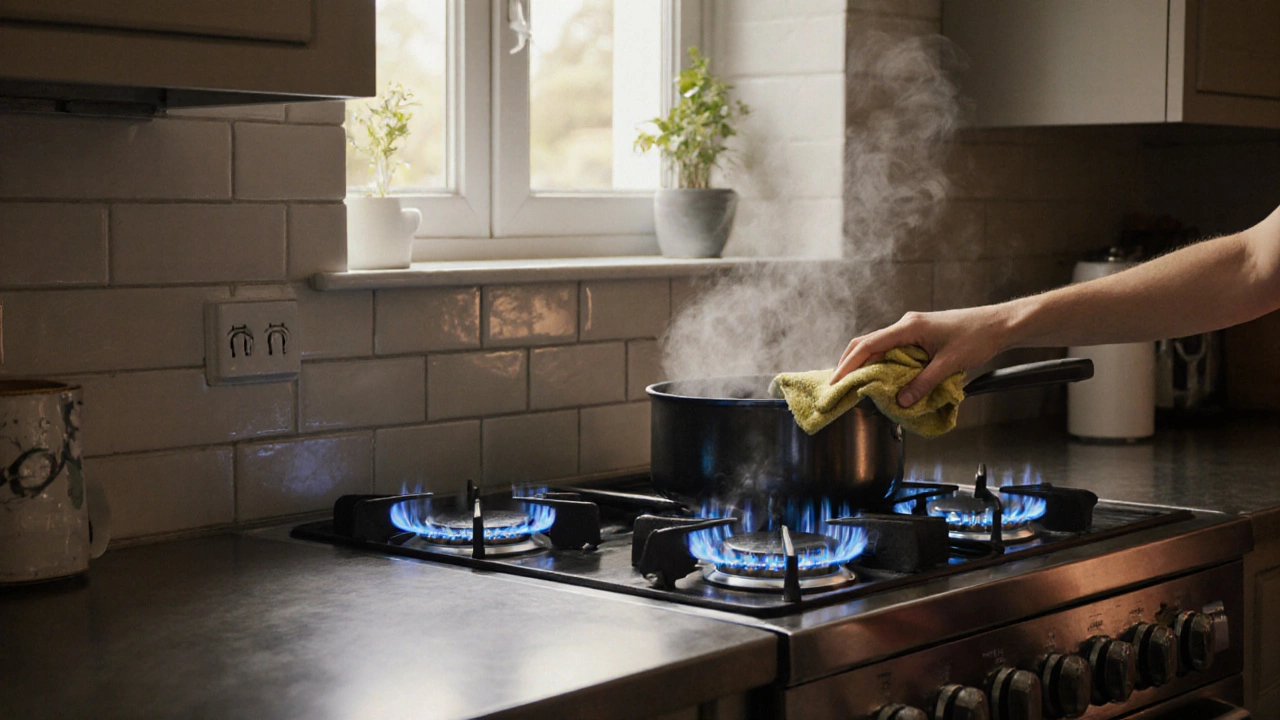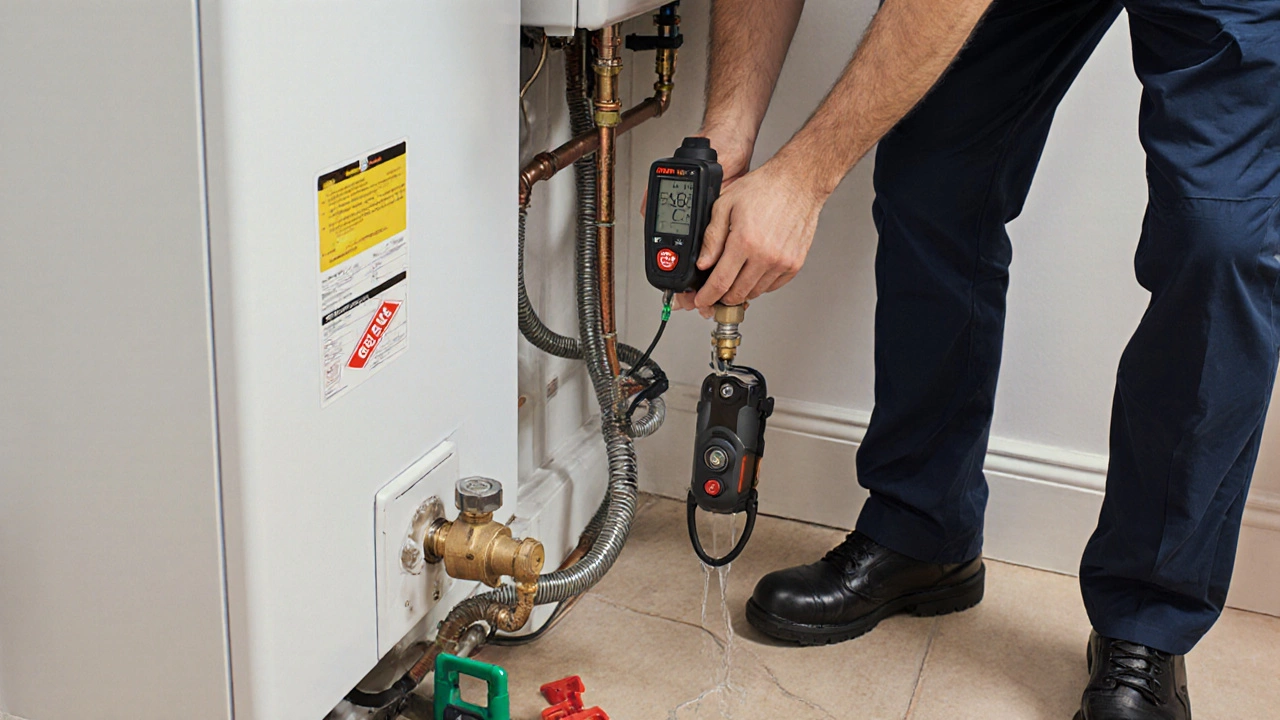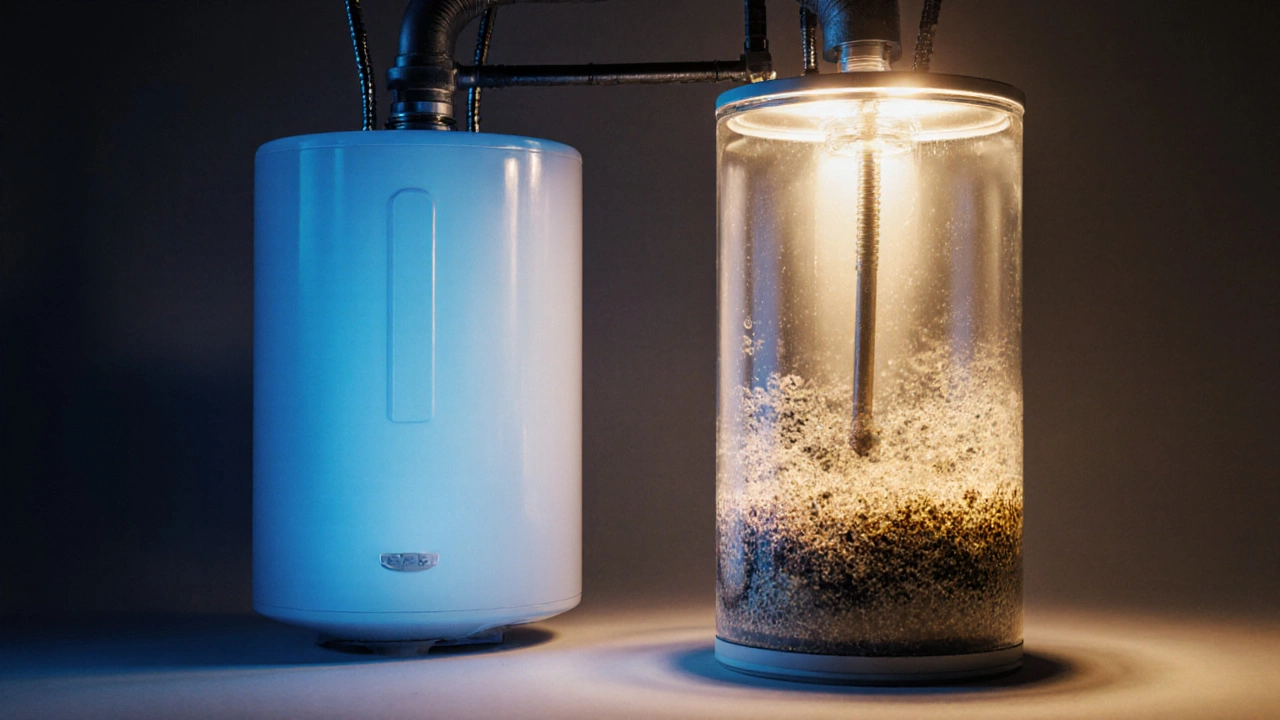
- 23 Nov 2025
- Gideon Thornton
- 0
Gas Appliance Lifespan Calculator
Most people don’t think about how long their gas appliance will last until it stops working. Then suddenly, you’re without hot water, a cold kitchen, or a broken boiler in January. The truth is, gas appliances don’t last forever-but they don’t need to be replaced every few years either. Knowing the typical life expectancy of your gas cooker, boiler, or water heater helps you plan ahead, avoid emergencies, and make smarter repair or replacement decisions.
Gas Cookers and Hobs: 15 to 20 Years
Your gas hob or built-in cooker is one of the most used appliances in the house. You use it every day. But because it’s built with simple mechanical parts-burners, valves, igniters, and metal casings-it often lasts longer than you expect. Most gas cookers last between 15 and 20 years with normal use and basic cleaning.
Signs it’s nearing the end? Uneven flames, delayed ignition, or a pilot light that won’t stay lit. These aren’t always signs of a dying appliance-they’re often fixable with a cleaning or a new igniter. But if the control knobs are cracked, the burners are rusted through, or the oven door doesn’t seal properly, repair costs start to add up. At that point, replacement becomes more economical.
One thing most homeowners miss: regular cleaning of the burner caps and ports. Grease and food debris clog the gas flow. That doesn’t just affect performance-it can shorten the life of the valve system. A quick wipe-down every month and a deep clean once a year can add five years to your cooker’s life.
Gas Boilers: 10 to 15 Years
If you live in the UK, your gas boiler is probably your most expensive and critical gas appliance. It heats your home and provides hot water. The average gas boiler lasts 10 to 15 years. Modern condensing boilers, which became standard after 2005, tend to sit at the higher end of that range.
Why the shorter lifespan compared to cookers? Boilers run constantly in winter, face high pressure, and deal with water chemistry. Limescale buildup, corrosion, and pump wear are the main killers. A boiler that’s never been serviced will often fail before 10 years. One that gets an annual service from a Gas Safe registered engineer can easily hit 15.
Look out for these warning signs: strange noises (banging, gurgling), rising energy bills, cold spots in radiators, or water leaks around the unit. These aren’t always signs you need a new boiler. A power flush or a new pump might fix it. But if your boiler is over 12 years old and needs a major part replaced-like the heat exchanger-it’s usually cheaper to replace the whole unit.
Gas Water Heaters: 8 to 12 Years
Gas water heaters (also called gas cylinders or storage tanks) have a shorter life than boilers or cookers. Most last between 8 and 12 years. That’s because they’re constantly heating water, which causes sediment buildup at the bottom. This sediment acts like insulation, forcing the burner to work harder, which leads to overheating and tank corrosion.
The biggest killer of gas water heaters? Lack of maintenance. Draining a few gallons of water from the tank every six months removes sediment and extends life. Replacing the anode rod (a sacrificial metal rod that protects the tank from rust) every 3-5 years can add years to its life. Most homeowners never do this.
If your water heater is over 10 years old and you’re getting rusty water, inconsistent temperatures, or puddles around the base, it’s likely done. Replacing the anode rod at this point won’t help-the tank itself is corroded. A new unit will save you money in the long run through better efficiency and fewer breakdowns.

Gas Fireplaces and Heaters: 10 to 15 Years
Gas fireplaces and standalone gas heaters are often seen as luxury items, but they’re still gas appliances-and they need care. Most last 10 to 15 years. The main issues? Dust buildup in the burner, faulty thermocouples, or cracked ceramic logs.
Unlike boilers or water heaters, gas fireplaces don’t run constantly. That helps them last longer. But if you use yours daily in winter, wear and tear adds up. A flickering flame or a smell of gas (even faint) should never be ignored. It’s not always a leak-it could be a blocked vent or a dirty burner. But if the unit is over 12 years old and you’re constantly calling a technician, replacement is the smarter move.
What Shortens Gas Appliance Life?
It’s not always age that kills gas appliances. Here’s what actually wears them out faster:
- Skipping annual servicing - Gas Safe engineers check for gas leaks, carbon monoxide risks, and component wear. Skipping this is the #1 reason appliances fail early.
- Poor ventilation - Gas appliances need fresh air to burn cleanly. Blocking vents or installing in tight, poorly ventilated spaces causes incomplete combustion and soot buildup.
- Hard water - In areas like Bristol, where water is hard, limescale builds up fast in boilers and water heaters. Without a water softener or regular flushing, components clog and overheat.
- DIY repairs - Trying to fix a gas valve or thermocouple without training can make things worse. A small mistake can lead to a gas leak or fire.
- Overuse - Running a boiler 24/7 in winter without a programmable thermostat puts extra stress on the system.
How to Extend the Life of Your Gas Appliances
You don’t need to replace your gas appliances every decade. With simple habits, you can stretch their life by years:
- Get an annual service - Hire a Gas Safe registered engineer. It costs £60-£100 but prevents £1,000+ repairs.
- Keep vents and filters clean - Dust blocks airflow. Wipe down air intakes on boilers and cookers every few months.
- Drain your water heater - Twice a year, connect a hose to the drain valve and let out 5-10 litres. Do this in spring and autumn.
- Use a programmable thermostat - Don’t let your boiler run at full blast all day. Set it to heat only when you’re home or awake.
- Don’t ignore small issues - A strange smell, a flickering flame, or a pilot light that goes out? Call a pro. Don’t wait until it breaks completely.

When to Repair vs. Replace
Here’s a simple rule: if the repair cost is more than half the price of a new unit, and the appliance is over 70% of its expected lifespan, replace it.
For example:
- A 14-year-old boiler needs a £500 heat exchanger. New boilers start at £1,800. Replace it.
- A 10-year-old water heater leaks. Replacement is £800. Drain and flush it first. If it stops leaking, it might last 2 more years.
- A 17-year-old cooker has a broken igniter. Replacement part: £40. Fix it.
Also consider efficiency. A 15-year-old boiler might be 75% efficient. A new A-rated model is 94%. That’s a 20% drop in energy use. Over five years, that could save you £300-£500 on bills.
What Happens When Gas Appliances Fail?
Most gas appliances don’t just stop-they fail dangerously. A cracked heat exchanger can leak carbon monoxide. A gas valve leak can cause an explosion. That’s why you never ignore:
- A rotten egg smell (added to gas as a warning)
- Yellow or orange flames (should be blue)
- Condensation on windows or walls near the appliance
- Headaches, dizziness, or nausea when the appliance is running
If you suspect a gas leak, turn off the gas at the mains, open windows, leave the house, and call the National Gas Emergency Service on 0800 111 999. Don’t turn lights on or off. Don’t use your phone inside. Safety comes first.
Final Thoughts
Gas appliances are built to last-but only if you treat them right. Most people wait until something breaks before they think about maintenance. By then, it’s often too late. The difference between a 12-year-old boiler and a 16-year-old boiler isn’t luck. It’s a service record, a drained tank, and a clean burner.
Don’t wait for disaster. Check your appliances. Know their age. Keep them clean. Get them serviced. You’ll save money, stay safe, and avoid the stress of a cold house in winter.
How long does a gas cooker typically last?
A gas cooker typically lasts between 15 and 20 years with regular cleaning and proper use. Issues like uneven flames or delayed ignition are often repairable, but rusted burners or cracked controls usually mean it’s time to replace.
Should I replace my 12-year-old boiler?
Not necessarily. A 12-year-old boiler is still within its expected lifespan of 10-15 years. If it’s running well and has had annual services, it can last a few more years. But if repairs are expensive (like a new heat exchanger), replacement is often more cost-effective and energy-efficient.
Can I extend the life of my gas water heater?
Yes. Draining sediment from the tank every six months and replacing the anode rod every 3-5 years can add 3-5 years to its life. Most homeowners skip these steps, which is why water heaters often fail before 10 years.
What are the signs my gas appliance is dangerous?
Yellow or orange flames, a rotten egg smell, condensation on windows, or unexplained headaches near the appliance are red flags. These can indicate carbon monoxide leaks or gas leaks. Turn off the gas, ventilate the area, and call the National Gas Emergency Service immediately.
Is it worth repairing a 15-year-old gas appliance?
It depends. If the repair costs less than half the price of a new unit and the appliance is still efficient, repair it. But if it’s over 12 years old and needs a major part (like a heat exchanger or burner assembly), replacement is usually better. New models are 20-30% more efficient, which saves money on bills.

